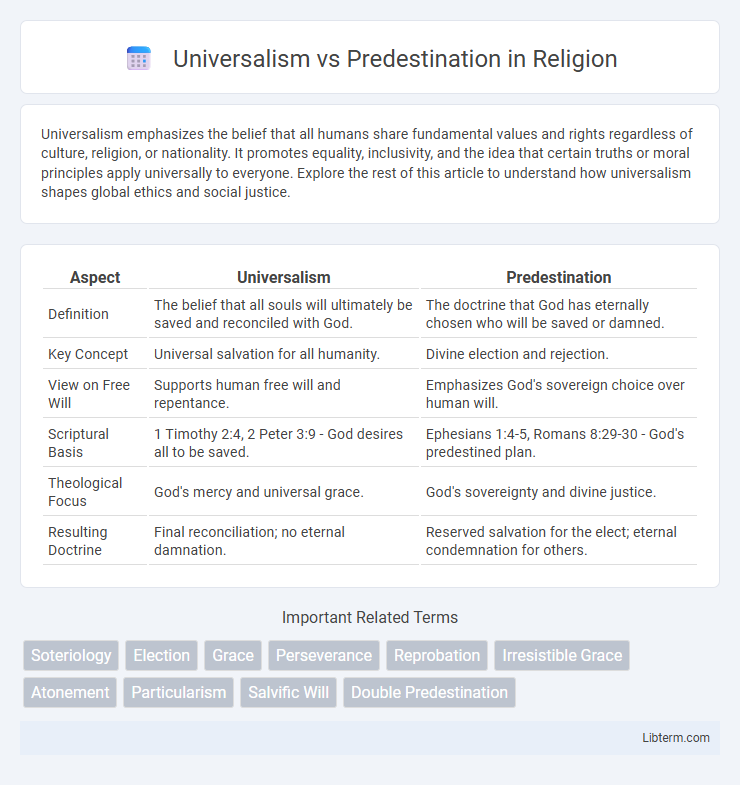Universalism emphasizes the belief that all humans share fundamental values and rights regardless of culture, religion, or nationality. It promotes equality, inclusivity, and the idea that certain truths or moral principles apply universally to everyone. Explore the rest of this article to understand how universalism shapes global ethics and social justice.
Table of Comparison
| Aspect | Universalism | Predestination |
|---|---|---|
| Definition | The belief that all souls will ultimately be saved and reconciled with God. | The doctrine that God has eternally chosen who will be saved or damned. |
| Key Concept | Universal salvation for all humanity. | Divine election and rejection. |
| View on Free Will | Supports human free will and repentance. | Emphasizes God's sovereign choice over human will. |
| Scriptural Basis | 1 Timothy 2:4, 2 Peter 3:9 - God desires all to be saved. | Ephesians 1:4-5, Romans 8:29-30 - God's predestined plan. |
| Theological Focus | God's mercy and universal grace. | God's sovereignty and divine justice. |
| Resulting Doctrine | Final reconciliation; no eternal damnation. | Reserved salvation for the elect; eternal condemnation for others. |
Understanding Universalism: Core Beliefs and History
Universalism centers on the belief in universal reconciliation, positing that all souls will ultimately achieve salvation regardless of their earthly actions, reflecting a fundamental view of divine love and mercy. Historically rooted in early Christian thought, Universalism evolved through theologians like Origen and modern proponents who challenge traditional doctrines of eternal damnation. This doctrine emphasizes inclusive salvation, contrasting sharply with predestination, which asserts that God has predetermined the elect for salvation and others for damnation.
Predestination Explained: Origins and Key Concepts
Predestination, rooted in Calvinist theology, asserts that God has eternally chosen specific individuals for salvation or damnation, independent of human actions or merit. Originating from Augustine's teachings and further developed during the Reformation, this doctrine emphasizes divine sovereignty and the immutability of God's will. Key concepts include unconditional election, reprobation, and irresistible grace, highlighting the predetermined nature of salvation outcomes.
Scriptural Foundations: Universalism in Religious Texts
Universalism finds scriptural support in verses such as 1 Timothy 2:4, which states God desires all people to be saved and come to a knowledge of truth. Passages like Colossians 1:20 emphasize Christ's reconciling work extending to all creation, suggesting a universal scope of redemption. These texts provide a foundation for the belief that divine grace ultimately leads to the salvation of every soul, contrasting with doctrines that limit salvation to a predestined elect.
Scriptural Support for Predestination
Scriptural support for predestination is found prominently in passages such as Romans 8:29-30, which speaks of God's foreknowledge and predestination of believers to be conformed to the image of Christ. Ephesians 1:4-5 highlights God's election and predestining of individuals for adoption as His children before the foundation of the world. These verses affirm the theological framework that God sovereignly chooses and determines the salvation of individuals according to His divine plan.
Major Theological Differences Between Universalism and Predestination
Universalism teaches that all souls will ultimately achieve salvation and reconciliation with God, emphasizing God's infinite love and mercy. Predestination asserts that God has sovereignly chosen certain individuals for salvation while others are destined for damnation, highlighting divine sovereignty and election. The major theological difference lies in Universalism's inclusive salvation versus Predestination's selective election based on God's predetermined plan.
Soteriology: How Salvation is Viewed in Both Doctrines
Universalism teaches that salvation is ultimately extended to all souls, emphasizing God's boundless love and the restoration of all beings. Predestination centers on the belief that God has sovereignly chosen specific individuals for salvation, highlighting divine election and grace as the basis for redemption. Both doctrines address soteriology by presenting contrasting views on the scope and mechanism of salvation within Christian theology.
Prominent Figures: Advocates of Universalism and Predestination
Prominent figures advocating Universalism include Origen, who emphasized the eventual salvation of all souls, and Friedrich Schleiermacher, who argued for God's universal love overcoming damnation. In contrast, John Calvin is a leading proponent of Predestination, asserting God's sovereign election of the saved, while Jonathan Edwards reinforced Calvinist doctrines emphasizing divine sovereignty and eternal election. These figures shaped theological debates by promoting either the universal scope of salvation or the exclusive nature of divine election.
Universalism and Predestination in Modern Christianity
Universalism in modern Christianity emphasizes the belief that all souls will eventually achieve salvation, reflecting a hopeful interpretation of God's grace and mercy. Predestination holds that God has eternally chosen specific individuals for salvation or damnation, highlighting divine sovereignty and foreknowledge. Contemporary theological debates continue to explore the tension between these doctrines, influencing denominational perspectives and pastoral approaches.
Philosophical Implications and Moral Questions
Universalism challenges the deterministic framework of Predestination by asserting that salvation and moral redemption are accessible to all, fostering a philosophy rooted in hope and inclusivity. Predestination raises profound moral questions about free will, divine justice, and human responsibility, as it implies predetermined outcomes beyond individual control. The philosophical tension between these doctrines centers on the nature of divine omniscience versus ethical accountability, prompting debates about the meaning of moral agency in a seemingly preordained cosmos.
Contemporary Debates: Relevance in Today’s Religious Thought
Contemporary debates on Universalism versus Predestination emphasize their impact on doctrines of salvation, divine justice, and human free will in modern theology. Universalism's inclusive approach challenges traditional predestinarian views by advocating universal reconciliation and denying eternal damnation, influencing progressive Christian movements and interfaith dialogues. Predestination remains significant in Calvinist and Reformed traditions, shaping discussions about divine sovereignty, election, and moral responsibility within contemporary religious communities.
Universalism Infographic

 libterm.com
libterm.com